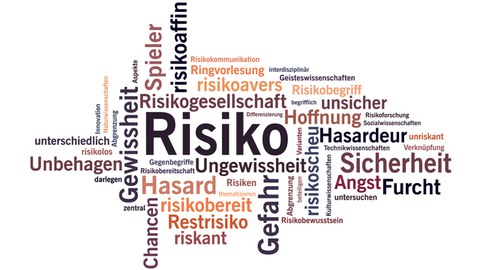29.03.2016
Call for Participants: TU Dresden Summerschool 2016 „Risk Communication and Narratives of Risk“
Die Wahrnehmung von Risiken hat sich in den letzten Jahren deutlich verstärkt. Das gilt nicht zuletzt für die Einschätzung von Umweltrisiken, Lebensmittel- und Ernährungsrisiken, Finanzrisiken sowie Sicherheitsrisiken. Diese Risiken verdichten sich zunehmend zu Bedrohungsszenarien in einer unübersichtlich gewordenen Welt voller Ungewissheiten. Für diese Welt ist auch kennzeichnend, dass Risiken immer seltener als Chancen wahrgenommen werden, sondern vielmehr als Bedrohungen.
Die Verdichtung der Risikowahrnehmung führt einerseits zu einer intensivierten Nachfrage nach wissenschaftlicher Expertise. Andererseits wird die Glaubwürdigkeit solcher Expertise zunehmend in Frage gestellt, weil in einer als gefährlich wahrgenommenen Welt das Misstrauen gegen jede Art von Expertenaussagen ubiquitär wird. Experten gelten zunehmend als privilegierte Elite, der häufig mit Argwohn begegnet wird. Die Medienrevolution der letzten Jahre mit ihrem explosionsartigen Anwachsen von Information und Kommunikation, bei der Expertenwissen und Laieneinschätzungen kaum noch voneinander unterscheidbar sind, hat diesen Eindruck erheblich verstärkt.
Risikokommunikation ist damit zu einer zentralen Anforderung, aber auch zu einem Grundproblem der Wissenschaft geworden. Hinzu kommt, dass Risikokommunikation die Risikowahrnehmung verstärkt. Je mehr über Risiken gesprochen wird, desto realer und bedrohlicher erscheinen sie. Dieses Phänomen hängt nicht zuletzt damit zusammen, dass in der Kommunikation von Risiken Transformationen der Semantik von Risiko und Risikonarrative eine erhebliche Rolle spielen. Wenn Risiko semantisch nur noch als Gefahr und nicht mehr auch als Chance erscheint, verdichtet das die Risikowahrnehmung erheblich. Dabei ist aber keineswegs klar, ob von solcher Risikowahrnehmung tatsächliche oder nicht eher „gefühlte“ Risiken erfasst werden. Risikonarrative wiederum, zu denen Katastrophennarrative ebenso wie Rettungsnarrative gehören, repräsentieren Risiken häufig im Modus von Endzeitszenarien, Verschwörungserzählungen oder heroischen Rettungstaten.
Wie Expertenwissen und Risikokommunikation besser miteinander vermittelt werden können, wie man die Semantiken von Risiko und Risikonarrative analysiert und kommunikativ berücksichtigt, sind deshalb zentrale Fragen der Summerschool „Risikokommunikation und Risikonarrative“.
Die TU Dresden als Standort für Risikoforschung in unterschiedlichen Fachbereichen lädt damit zu einem intensiven Austausch über die fächergruppenspezifischen Perspektiven und Methoden in der Auseinandersetzung mit dem Thema Risiko ein. Die spezifischen Probleme von Risikokommunikation eignen sich in besonderer Weise für wissenschaftliche Zusammenarbeit über die Grenzen der sogenannten ‚zwei Kulturen‘ von sciences und humanities hinweg.
Beteiligte Fächer: Literaturwissenschaft, Medien- und Filmwissenschaft, Umweltwissenschaft, Lebensmittelchemie, Wirtschaftswissenschaft, Politikwissenschaft, Sprachwissenschaft.
Ort und Zeitraum: Die TU Dresden Summerschool „Risikokommunikation und Risikonarrative wird vom 3.–7. Oktober 2016 an der TU Dresden und dem Deutschen Hygienemuseum Dresden stattfinden.
Teilnehmerkreis: Die Einladung richtet sich an Nachwuchswissenschaftler und Nachwuchswissenschaftlerinnen (v.a. Promovierende und Post-Docs) aller beteiligten Fächer. Bewerben können sich daneben auch Promovierende und Postdoktoranden aus den Fächern Journalistik/Publizistik und Kommunikationswissenschaft. In der Auswahl wird eine Mischung von Bewerbungen aus den Bereichen der sciences und der humanities berücksichtigt. Zentral für die Bewerbung ist neben kurzem Motivationsschreiben und Curriculum Vitae (tabellarisch) eine Skizze Ihres eigenen Forschungsvorhabens, einer Projektidee oder einer Fragestellung, die Sie im Rahmen der Summerschool diskutieren möchten.
Die Summerschool wird in englischer Sprache abgehalten. Reisekosten können entsprechend der Richtlinien der Deutschen Forschungsgemeinschaft bis zu einem festgelegten Höchstsatz erstattet werden. Die Unterbringung wird komplett von den Organisatoren finanziert.

